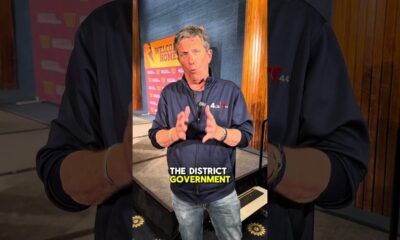(The Center Square) – More than $1 billion in public taxpayer money is expected to be spent on the area around a $2.7 billion roofed stadium for the Washington Commanders as the team moves back to the 180 acres at the former RFK Stadium site for the 2030 NFL season, according to a deal announced on Wednesday.
The district would pay $500 million through Sports Facilities Fee with a tax capture at the stadium would be created to pay off bonds on $175 million for the parking structure. Events DC, which is partially funded through taxpayer money, will put $181 million toward parking garages on the property and D.C. will pay $202 million for utilities infrastructure, roadways and a WMATA transit study.
The D.C. Council must approve the deal. In early January, Pres. Joe Biden signed the D.C. Robert F. Kennedy Memorial Stadium Campus Revitalization Act, which gave control of the property to D.C. for 99 years and stipulated D.C. may not use federal funds for “stadium purposes on the campus, including training facilities, offices and other structures necessary to support a stadium.”
The Commanders have agreed to pay the $2.7 billion toward stadium construction. The team will use an NFL loan and revenue from personal seat licenses toward its stadium funding. Teams also generally put money from stadium naming rights toward that funding as well.
The team currently plays in Maryland and will continue to play there until the new stadium is scheduled to be completed in 2030.
“What I hope has been made clear is that this is a massive investment and the largest private investment in the district’s history,” D.C. Mayor Muriel Bowser said. “The Commanders will be committing $2.7 billion to building this stadium, so the total investment will be $3.6 billion.”
The mayor, Commanders ownership and NFL Commissioner Roger Goodell claimed that the project would allow for development at the project and be an economic benefit to the community.
“We have seen throughout the country new stadiums transform communities,” Goodell said. “Since 2001, more than $32 billion has been invested in stadiums and there are at least eight more projects underway at an estimated cost of $220 billion. This will be critical in revitalizing an area that has been dormant and undeveloped for more than 30 years when the team first left.”
But economists who have studied stadiums and surrounding developments have repeatedly shown those claims are not true.
“The argument that sports stadiums stadium are economic catalysts is as ridiculous as debunked claims that vaccines cause autism,” economist J.C. Bradbury told The Center Square. “Economists have studied the economic effects of stadiums for 50 years, and the research consistently finds that sports venues have limited to no economic benefits for host communities. This is a settled question and represents the consensus opinion among economists.”
Bradbury works at Kennesaw State University in Georgia and has extensively studied stadium projects himself along with writing on the consensus of economic papers related to stadium projects and developments.
Bradbury pointed toward Commanders owner Josh Harris, his $10 billion net worth, and a deal for a new Philadelphia 76ers and Flyers arena that will include taxpayer funds.
“If his $10 billion net worth isn’t enough to build himself a nicer football stadium, then he could offload one of his other franchises,” Bradbury said.
The area around the new stadium on the RFK would include restaurants, entertainment venues, hotels, housing, green space and a sportsplex that the mayor’s budgeted $89 million.
The entire campus will have approximately 5,000-6,000 housing units, including at least 30% affordable housing. A Kingman Park District will be created to include housing, mixed-use development, open space and recreational space.
“Claims of economic benefits are nothing but a pretense for politicians to justify the wealth transfer from taxpayers to wealthy team owners and upper crust patrons who can afford season tickets, club seats and luxury boxes,” Bradbury said. “The supposed economic case for venus subsidies is nothing more than a Trojan Horse to give the well-to-do beneficiaries access to the local treasury. Any elected official advocating on behalf of such a fanciful folly should be recalled for gross incompetence.”














































